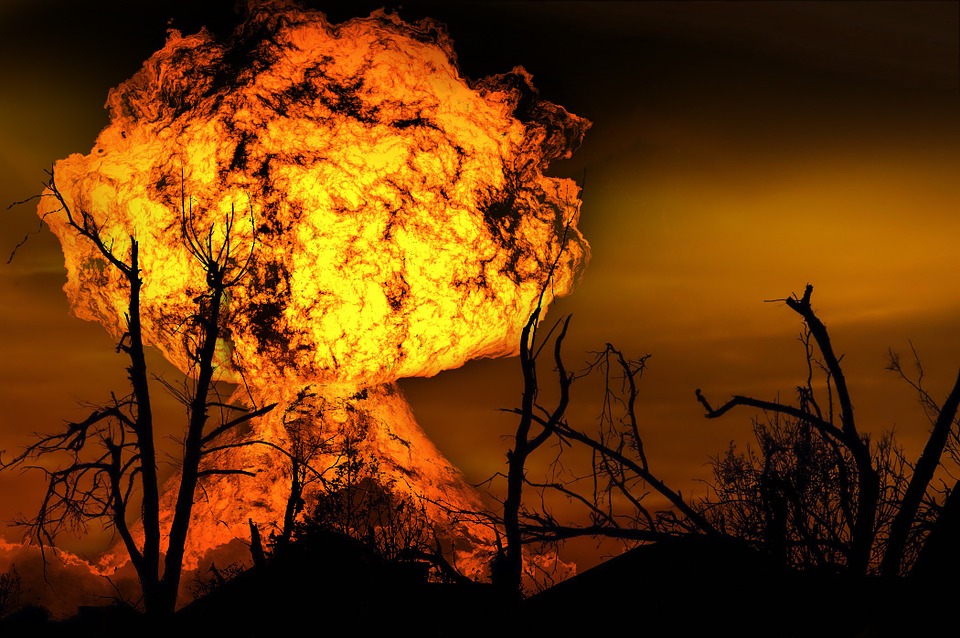by John Feffer
The world according to Donald Trump is very dark indeed. The American economy has tanked. Mexico has sent a horde of criminals over the border to steal jobs and rape women. The Islamic State, cofounded by Barack Obama and Hillary Clinton, is taking over the globe. “Our country’s going to hell,” he declared during the Republican primaries. It’s “like medieval times,” he suggested during the second presidential debate. “We haven’t seen anything like this, the carnage all over the world.”
For Trump, it’s not morning in America, it’s just a few seconds before midnight on the doomsday clock. Although his campaign doggedly continues to promise a new beginning for the country, the candidate and his advisers are sending out a very different message: the end is nigh. These Cassandras all agree that, although Obama’s two terms were no walk in the park, the stakes in 2016 are world-destroyingly higher. If Clinton is elected, the future could be, as conservative political operatives Dick Morris and Eileen McGann titled their recent book, Armageddon.
Presidential challengers often paint a grim picture of the world of the incumbent, overstating the case for dramatic effect. Ever the showman, Trump has no compunction about repeatedly going way over the top, calling the U.S. military a “disaster” because it’s supposedly underfunded and the United States a “third-world country” thanks to its precipitous economic decline. Trump talks as if he were the hybrid offspring of Karl Marx and Ann Coulter.
Trumpworld, however, is a photographic negative of statistical reality. The U.S. economy has been on an upswing for the last several years (though its benefits have been anything but evenly distributed). Nationally, violent crime is on the decline (though murder rates aresoaring in some cities like Chicago). The Obama administration averted war with Iran and negotiated a détente with Cuba (though it continues to wage war in other parts of the world and has maintained sky-high Pentagon spending). If the Obama years are hardly beyond criticism, they are hardly beneath contempt either.
In dispensing with what one of his senior aides called the “reality-based community,” George W. Bush’s administration attempted to create an alternative, on-the-ground reality, particularly through the direct exercise of American military power — and we know how well that turned out. Trump seems to have even less interest in the “reality-based community.” He’s evidently convinced that the sheer power of his own bluster, even without the firepower of that military, should be sufficient to alter our world. After all, didn’t it win him a loyal following on TV and — to the disbelief of politicians and media commentators everywhere — the Republican presidential nomination?
The reality-based community — which Trump labels the “elite” — wants nothing to do with him. The discrepancy between his rhetoric and what other people call facts explains in part why even conservative elites — prominent Republicans like Brent Scowcroft and John Warner, conservative columnists like George Will, and even neoconservatives like Bill Kristol, not to speak of right-leaning newspapers like The Arizona Republic and the Dallas Morning News — have made historic decisions to abandon their party’s presidential nominee.
But don’t kid yourself. There is method to Trump’s particular version of madness. He and his slyly smiling running mate Mike Pence are playing up their vision of scorched-earth America not just to win general political points but to appeal to a very specific set of voters by tapping into the apocalyptic strain in American politics. The evangelicals, anti-globalists, and white power constituencies that form the bedrock of his support hear in Trump’s blasts more than just a set of fun-house facts. When the Donald says that Hillary is “the devil” and America’s going to hell, this constituency — steeped in Biblical prophecy, survivalist ideology, and racist conspiracies — takes him literally. America is on the verge of (take your pick): the Rapture, an end-of-days contest between American patriots and U.N. invaders, or an all-out race war to the finish.
And here’s what makes Trump’s carnivalesque presidential campaign especially topsy-turvy. He’s been slouching toward just about every kind of Armageddon imaginable, except the genuine planetary ones that are — or should be — almost unavoidable these days. He has, after all, dismissed climate change as a “hoax” and a Chinese scam. He is so blasé about nuclear weapons that he’s been comfortable with the thought of American allies Japan, South Korea, and Saudi Arabia developing their own. He has nothing whatsoever to say about potential global pandemics (but plenty to spout about the potentially malign effects of vaccinations).
To grasp the nature of such genuine dangers requires at least a minimal understanding of science. It also requires a genuine concern that the world as we know it could indeed end in our lifetimes or those of our children and grandchildren.
Of course, not everyone thinks the apocalypse is a bad thing.
The Rise of the Evangelical Right
It wasn’t particularly difficult to portray 1980 as a gloomy time for America. The spike in oil prices in 1979 had sent the U.S. economy into a tailspin and the Soviet invasion of Afghanistan was propelling the two superpowers into another cycle of Cold War tensions. Iranian radicals were holding 52 U.S. diplomats and citizens hostage in Tehran, which produced a daily (and, thanks to Ted Koppel’s Nightline reports, nightly) humiliation for President Jimmy Carter and his administration.
As the Republican Party’s presidential candidate, Ronald Reagan responded to these developments by continually playing up the image of an America in decline. His grim vision of that American future cemented his ties to an ascendant right wing within the evangelical community. As early as 1971, intellectual historian Paul Boyer pointed out, Reagan claimed that “the day of Armageddon isn’t far off.” He was referring then to turmoil in the Middle East and the pivotal role of Israel there. “Everything is falling into place,” he added. “It can’t be long now.”
Reagan was not exactly an easy sell to the Bible belt. Divorced and anything but a devoted churchgoer, he was closely associated in the public mind with that Sodom of the West Coast, Hollywood. In the 1980 election, he was also up against Jimmy Carter, a born-again Christian who openly discussed his faith.
Admittedly, Reagan benefitted from the endorsement of the Moral Majority, founded by Reverend Jerry Falwell in 1979, and he began playing directly to the religious crowd by establishing a new tradition of inserting “God bless America” into his speeches. But it was those repeated references to Armageddon that cemented his relationship with the religious right. Apocalyptic thinking is central to the worldview of evangelicals. Indeed, it’s what principally distinguishes them from mainstream Christians. “The one thing that affects how they live their daily lives,” writes historian of religion Matthew Avery Sutton, “is that they believe we are moving towards the End Times, the rise of the Antichrist, towards a great tribulation and a horrific human holocaust.”
The mainstream media was shocked that Reagan then brought such doomsday rhetoric into the Oval Office. “It is hard to believe that the President actually allows Armageddon ideology to shape his policies toward the Soviet Union,” the New York Times editorialized just before the 1984 election. “Yet it was he who first portrayed the Russians as satanic and who keeps on talking about that final battle.” Reagan easily went on to win a second term. Later, George W. Bush would employ similar apocalyptic references to justify the invasion of Iraq and unqualified support for Israel, and it didn’t prevent him from winning a second term either.
When Barack Obama became president in 2008, however, evangelicals suffered a significant drop in political influence. They continued to cling to Congress and a few Supreme Court justices — along with their guns and religion — but they had little leverage over a president that a majority of Republicans believed to be a foreign-born Muslim. (You’re either with us or you’re born in Kenya.)
Eight years later, the evangelical community faced an embarrassment of riches in the Republican primaries: a couple of born-again candidates (Mike Huckabee and Ted Cruz), several evangelical Catholics (Rick Santorum, Marco Rubio, and Jeb Bush), and even an evangelical Seventh Day Adventist (Ben Carson). In comparison, Donald Trump came up way short on the faith front. Many evangelicals were skeptical of him because, like Reagan, he did not fit the mold of an upstanding Christian candidate. He’d been divorced, indulged in high-profile extramarital affairs, taken pro-choice positions, came from that East Coast Gomorrah, New York City, and even refused to ask Godfor forgiveness. Once he won the party’s nomination, however, Trump’s approval rating rose sharply among evangelicals who represent one-fifth of the voting public. Seventy-eight percent of them now support him, according to a recent Pew survey.
Trump has triumphed among evangelicals in part by changing his views. For instance, he now claims that he plans to repent before God (in some unspecified future) and swears that he will help restore the evangelical voice to politics. He has become firmly anti-abortion and traded in a more even-handed approach to the Arab-Israeli conflict for the hardline position of Prime Minister Benjamin Netanyahu that finds favor in the evangelical community. He has even convinced some evangelicals that his new relationship with Jesus has turned him into what James Dobson calls a “baby Christian.”
Trump also appeals to a certain pragmatic streak among evangelicals. They have become convinced that only he can tip the Supreme Court in the right direction, roll back the nuclear agreement with Iran, and hold back a potential tide of social protest. “Trump speaks to the profound fears animating so many white evangelicals today,” says R. Marie Griffith, director of the John C. Danforth Center on Religion and Politics at Washington University. “Above all, the fear that they and their values are being displaced by foreign, immigrant, and Muslim forces as well as by domestic movements such as Black Lives Matter, gay rights, women’s rights, and more.”
However, this focus on the pragmatic desire of evangelicals to regain the kind of political influence and power they’ve lost over the last seven years only goes so far in explaining Trump’s appeal. Far more important, on millenarian websites, Trump emerges as the mysterious weapon that God is now wielding to bring the righteous closer to the rapture. “God is preparing to shake the nations of the world,” an evangelical blogger writes in a typical endorsement of the candidate, “and I believe he is going to use Donald Trump to do it.” Another asserts, “I don’t know if God will use Trump to push back the coming of the anti-Christ. However, I know that without Trump, the tribulation cannot be far away. Therefore, I have to support Trump.”
Much millenarian support comes from a belief that God has anointed Trump the ultimate disrupter of the status quo, the human wrecking ball that will smite all the structures standing in the way of Christ’s second coming. No one (other than the Donald himself) would confuse the candidate with the Messiah, but some evangelicals imagine him in the role of a John the Baptist gone slightly berserk.
Certain evangelicals believe that their candidate will avert an apocalypse spurred on by godless Democrats; others that he will hasten that apocalypse and so the second coming. Given that Trump is a mass of contradictions — a bankrupt billionaire, the most elite of populists, a politician who has never held office — it’s no surprise that evangelicals can read into him almost anything they want, even if they then have a difficult time interpreting his “revelations.”
Against the Globalists
The film Amerigeddon, released this year and directed by the son of right-wing actor Chuck Norris, illuminates in graphic detail the paranoid worldview of what has come to be known as the alt-right: the tech-savvy, anti-globalist, anti-immigrant movement that hitherto lurked on the fringes of the Republican Party.
“The greatest threat to our freedom lies within our own government,”Amerigeddon proclaims in its trailer. In the film, traitors inside the Beltway have joined up with global terrorists and the United Nations to bring down America. It’s a movie with everything a survivalist could ever want: outsiders using an EMP (electro-magnetic pulse) to disable the U.S. power grid, big government imposing martial law, gun owners saving the day. If you could take only one DVD to your reinforced concrete bunker, this would be it.
Given that it debuted on only a handful of screens and disappointed even those who might otherwise embrace its hyperbolic content, Amerigeddon would be too ridiculous to mention — if it weren’t for Alex Jones.
Jones is a talk-radio host who also runs the website Infowars. He believes that the U.S. government has covered up its involvement in everything from the Oklahoma City bombing and 9/11 to the faked moon landing and WikiLeaks. He’s a libertarian (hates government), paleoconservative (hates liberals), and survivalist (his Infowars store carries a full line of “preparedness products” for the moment when the grid collapses).
 A hero of conspiracy theorists the world over, Jones appears in a cameo in Amerigeddon and has used his media empire to hype the film. For someone with such unorthodox views, he has quite a following. “Jones draws a bigger audience online than Rush Limbaugh and Glenn Beck combined — and his conspiracy-laced rants make the two hosts sound like tea-sipping NPR hosts on Zoloft,” wrote Alexander Zaitchek in Rolling Stone in 2011. His website attracts 40 millionunique visitors a month.
A hero of conspiracy theorists the world over, Jones appears in a cameo in Amerigeddon and has used his media empire to hype the film. For someone with such unorthodox views, he has quite a following. “Jones draws a bigger audience online than Rush Limbaugh and Glenn Beck combined — and his conspiracy-laced rants make the two hosts sound like tea-sipping NPR hosts on Zoloft,” wrote Alexander Zaitchek in Rolling Stone in 2011. His website attracts 40 millionunique visitors a month.
Jones has made more than a cameo appearance in Donald Trump’s campaign. When the candidate appeared on his show last December, the radio host promised him that he had the support of 90% of his listeners. “Your reputation is amazing,” Trump responded, “I will not let you down.” By refusing to become a more sensible mainstream presidential candidate and continuing to post bizarre early-morning tweets, he has indeed kept that promise.
If Trump has managed to lock down the evangelical vote with nary a quote from the Bible, with the alt-right crowd he has frequently cited chapter and verse from their prophets. So, for instance, he has peddled such conspiracy theories as the foreign birth of President Obama, the “thousands and thousands” of Muslims who celebrated the attacks on 9/11, and the government-engineered drought in California. Infowars promoted all of these “facts,” while also coming up with the “Hillary for Prison” meme that took the Republican convention in Cleveland by storm. Where other candidates have a brain trust, Trump has a mere meme trust.
Jones reserves much of his wrath for what he calls “globalists.” For the alt-right, “globalist” is a code word that, like “cosmopolitan,” conjures up a shadowy network of conspiratorial (and mostly Jewish) figures: George Soros, Henry Kissinger, the Rothschilds. Jones has his own version of end times. “The globalists are building a world, in their own words, where normal human life is over,” he rants. “It’s the devil. And the churches are not going to tell you. It’s an alien force, not of this world, attacking humanity, like the Bible and every other ancient text says.”
Trump has proven as unlikely a hero for anti-globalists as he has been for evangelicals. He is an international capitalist with investments in more than a dozen countries. His signature products are produced in China and Mexico. He has praised Russian President Vladimir Putin and counts Israeli Prime Minister Benjamin Netanyahu as a friend.
But Trump is an outsider where it counts, at least for those who live at the intersection of conspiracy and catastrophe. He rails against international organizations like the United Nations (should be downsized) and NATO (“obsolete”). Despite his global enterprises, he has opposed free trade and threatened to pull the United States out of the World Trade Organization. He supported Brexit, inveighs against immigrants, and insists on putting “America first.”
Not surprisingly, these messages also resonate with the white men who form the core of the alt-right, even though they are generally worried neither about the coming of the Antichrist nor the arrival of the U.N.’s “black helicopters.” These true “deplorables” obsess instead about a kind of slow-motion Armageddon in which the twin threats of demography and immigration will turn America into an unrecognizable (nonwhite) hell. They welcome, of course, Trump’s broadsides against Muslims and undocumented immigrants.
At The Daily Stormer, the neo-Nazi website, editor Andrew Anglin wrote during the Republican primary: “If The Donald gets the nomination, he will almost certainly beat Hillary, as White men such as you and I go out and vote for the first time in our lives for the one man who actually represents our interests.” Trump has retweeted a number of messages that originated with the alt-right, and his hiring of Stephen Bannon, the former executive chairman ofBreitbart News, as his campaign manager nailed down his connection to that community. “We’re the platform for the alt-right,” Bannon told journalist Sarah Posner at the Republican convention, referring to Breitbart News.
Trump is not simply a hero of the alt-right, he’s the man around which the community has now come to identify itself, the nexus of an anti-feminist, anti-Semitic, racist, conspiratorial worldview. Unlike the evangelical and survivalist communities, there is no ambivalence on the alt-right. Trump is their champion, the only person who can prevent their particular apocalypse — the victory of multiculturalism — from taking place.
For all three overlapping constituencies — evangelicals, anti-globalists, and the alt-right — Trump has transformed the paranoid style that has long lurked beneath the surface of American politics into a genuine and open electoral force. These groups support Trump because he promises to upend the secular, reality-based, internationalist status quo. On top of that, Trump is fundamentally uninterested in the day-to-day compromises of the policy world. He even disdains politicking within the Republican Party, which appeals to the many Republicans disgusted with their own party elite. As Erick Erickson, one of his conservative opponents, puts it, “At some point, the base of the party just wants to burn the house down and start over.”
At heart, Trump is an arsonist. At some level, he’s ready to pour that gasoline and strike that match. His apocalyptic approach to everyday politics is what puts fear into the hearts of liberals and conservatives alike — and what puts fire in the belly of the whitest of America’s insurgents.
The Real Dystopia
Supreme Court Justice Ruth Bader Ginsburg voiced the fears of many Americans when sheidentified New Zealand as a possible refuge from a Trumpocalypse — as if the Republican candidate’s victory in November would be an extreme weather event that renders much of the globe other than a few remote islands uninhabitable.
And there’s no doubt that Hurricane Donald would wreck the world. His opposition to efforts to address climate change and desire for a Parexit — canceling the Paris climate accord — would guarantee that the mercury in Mother Earth’s thermometer soars ever higher. His contempt for the global economy would undoubtedly precipitate a worldwide recession. His support for the unraveling of the European Union would lend a hand to European alt-right groups campaigning for its demise. His pledge to go mano a mano with the Islamic State would surely give that organization a new lease on life.
In the United States, meanwhile, Trump’s economic plans would further widen the gulf between the haves and have-nots, making a mockery of the blue-collar support he has attracted. He would hand considerable power over to evangelicals when it comes to transforming social policy and, by way of his Supreme Court nominations, influence the future well beyond his own term in office. Inspired by his example, alt-right forces would unquestionably bring their battles onto the streets of American cities.
Nor is Trump alone. Some version of his populist extremism can be found in every corner of the globe, from Vladimir Putin’s Russia and Viktor Orban’s Hungary to Recep Tayyip Erdogan’s Turkey, Rodrigo Duterte’s Philippines, and Daniel Ortega’s Nicaragua — not to mention the countries of other politicians, like France’s Marine Le Pen, who hope to seize power someday. Such leaders may be divided by religion, ethnicity, and even putative political ideology, but they all believe in putting their nation — and their personal ambitions — above the common global good. Individually, they are intent on constructing illiberal orders in their countries. Collectively, they are bent on destroying that fragile entity known as the international community and, thanks to climate change, the planet that goes with it.
Next month’s election is important. But the core supporters of Donald Trump are not going to move to Canada — or Russia — if their candidate loses. Those who crave the simplistic, authoritarian solutions offered by dangerous populists around the world are not going to retreat into political apathy simply because of the scorn heaped upon them by the mainstream. The apocalyptic rhetoric of Trump and his followers is a self-fulfilling prophecy. The gale-force winds of this populist hurricane have been intensified by decades of polarizing economic and social policies. Whatever happens in November, the forecast is for more stormy weather ahead.
Republished, with permission, from TomDispatch.






A couple of toss-away references to Israel and two to Netanyahu but not one word “Palestine” or “Palestinians” or “justice.”
Is Trump really so foolish as to believe his own outlandish claims regarding Isis?
Great argument, but I can’t help but think that this latest scandal — Trump’s alleged sexual predation — is losing him a good chunk of the apocalyptic constituency. Then again, logic and rationalism has never been that community’s strong suit.
Thanks also for the overview of Reagan’s appeal to the evangelistics, although it should be noted that, in response to their desire to see America’s nuclear arsenal put to use against the godless commies (no doubt to trigger Armageddon), Reagan informed them that he could see the “usefulness” of a “limited nuclear war” — not exactly a campaign promise but chilling enough to indelibly imprint itself upon my memory.